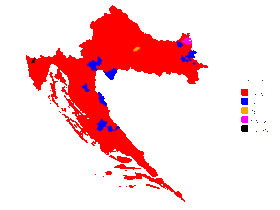- Czechs of Croatia
-
Czechs of Croatia
Česi u Hrvatskoj
Češi v ChorvatskuTotal population 10,510[1] Languages Religion Related ethnic groups Czechs are one of the recognised minorities of Croatia. According to the census of 2001 there were 10,512 Czechs in Croatia, compromising 0.24% of total population. They are also called by their non-Czech neighbours Pemci.
Contents
Geographic representation
Most Croatian Czechs live in Western Slavonia especially around the cities of Daruvar and Grubišno Polje. They compromise 5.33% population of Bjelovar-Bilogora county and 0.9% of Požega-Slavonia county. They compromise a relative majority in Končanica municipality and in villages like Veliki Zdenci, Mali Zdenci, Golubinjak etc. They can be also found in almost all major towns in Croatia.
Municipality Percentage Končanica 46.67% Dežanovac 23.48% Daruvar 18.90% Grubišno Polje 18.02% Sirač 10.21% Hercegovac 9.60% Veliki Grđevac 4.76% Lipik 3.52% Pakrac 3.03% Kaptol 2.49% Lipovljani 2.43% Kutina 1.53% Garešnica 1.34% Dubrava 1.13% Kutjevo 1.12% History
After the Treaty of Karlowitz in 1699, Slavonia changed hands from the Ottomans to Habsburgs, and the Muslim population fled. This left great areas vacant, and Hasburgs started to colonize new lands with people from all parts of their Empire. The first Czechs arrived in Slavonia around 1750s, and were settled in Western Slavonia throughout the 19th century. In Croatia, they could buy from ten or more acres of arable land for price of 1-acre (4,000 m2) they sold in the Czech lands. Czechs also settled other parts of Croatia such as Gorski kotar, and bigger cities where they were praised as skilled workers and clerks, but were assimilated in two or three generations. One of these urban Czechs was August Šenoa, Croatian writer and mayor of Zagreb. Czechs soon found the need to culturally organise themselves, and in 1874 the first Česka Beseda (Czech word) was found in Zagreb. This is an organization that promotes Czech language and culture in Croatia, and organised the first theater play in Czech language in the same year. In time Česke Besede were founded all across Croatia, and opened Czech libraries and Sport societies (Sokol). In 1911 the first Czech newspaper started printing in Zagreb.
The Kingdom of Serbs, Croats and Slovenes, established after the First World War, was very to the Czech minority. This has been attributed to the cordial relations with Czechoslovakia during the interwar period, and joint Slavic roots. The first Czech school was open in 1922 in Daruvar, and first kindergarten in 1926 also in Daruvar. Czechs organized themselves politically and formed a Czech party which was active only in the first years of Kingdom. From 1922 the newspaper Jugoslavšti Čechoslovácí (Yugoslav Czechoslovaks) was printed in Duruvar. Czechs, just like Slovaks generally did not collaborate with the occupying powers during the World War II. Some of them left to Czechoslovakia after the war, but a number of them subsequently returned, as the communists seized power in Czechoslovakia[2].
In Socialist, post World War II Yugoslavia Czechs enjoyed even greater rights, and more schools were opened. After the break-up of Yugoslavia, Czech areas were found near war operations and many Czechs participated in Croatian army. The Croatian constitution guarantees to have one joint Czech and Slovak representative in parliament. The current Czech and Slovak representative is Zdenka Čunhil from the Croatian Peasant Party.
Culture
The Czechs are organised in 24 Česka Beseda's all across Croatia that form the Czech Union of Croatia, an organization that promotes Czech language and culture in Croatia. Folk dance, poetry, singing and Czech courses are the main activities of Beseda's. Some Beseda's even have theater groups, and the Czech Union prints their weekly magazine calles Jednota (Unity). They organize festivals of theater groups, festivals of Czech children song, Naše Jaro-festival of schoolchildren cultural activities, Vanočka- festival of younger folkdance groups and biennal manifestation Dožinky in Daruvar celebrating end of harvest works. There are dozens of Czech primary schools and kindergartens and High School in Daruvar has one Czech department.
There are also two industrial brands associated with Croatian Czechs; Zdenka cheese, produced in a factory in Veliki Zdenci dominatly Czech village and Staročeško (Old-Czech) beer produced by a brewery in Daruvar.
Footnotes
- ^ Croatian 2001 census
- ^ Yugoslavia's National Minorities under Communism by Paul Shoup In: Slavic Review, Vol. 22, No. 1 (Mar., 1963), pp. 64-81
Ethnic groups in Croatia Native nation Autochthonous national minorities Serbs · Czechs · Slovaks · Italians · Hungarians · Jews · Germans · Austrians · Ukrainians · Rusyns · Bosniaks · Slovenes · Montenegrins · Macedonians · Russians · Bulgarians · Poles · Roma · Romanians · Turks · Vlachs · AlbaniansOthers Czech diaspora Europe North America South America Oceania Categories:- Czech diaspora
- Ethnic groups in Croatia
- Croatian people of Czech descent
- Croatia–Czech Republic relations
Wikimedia Foundation. 2010.

